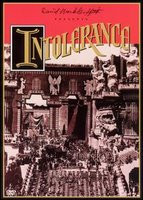 For some reason silent films just do not translate well for modern audiences, and not for their black and white photography. There just seems to be a fundamental sound barrier that keeps contemporary audiences at a distance. However, Wycliffe Gordon’s original score for D.W. Griffith’s Intolerance (1916), performed live last night to accompany a screening of the film as part of the Jazz Museum in Harlem’s "Harlem in the Himalayas" series at the Rubin Museum, demonstrated how music can break that barrier.
For some reason silent films just do not translate well for modern audiences, and not for their black and white photography. There just seems to be a fundamental sound barrier that keeps contemporary audiences at a distance. However, Wycliffe Gordon’s original score for D.W. Griffith’s Intolerance (1916), performed live last night to accompany a screening of the film as part of the Jazz Museum in Harlem’s "Harlem in the Himalayas" series at the Rubin Museum, demonstrated how music can break that barrier.Intolerance is an epic film of four thematically related stories from different periods of history (Babylon, 15th Century France, the Holy Land, and then contemporary California), running over three hours in length. Indeed Gordon and his ensemble played for nearly four hours straight, with only a twenty minute intermission. It was an epic performance, in which Gordon played throughout on trombone, trumpet, tuba, and didgeridoo, laying out for only the briefest passages.
Intolerance was Griffiths’ make-up movie for the racist Birth of a Nation. It was intended as a plea for peace and tolerance, although there is only one non-white face to be seen from an extra during a street scene. Many of the characters were heroic or villainous archetypes, with names like “Mountain Girl” and “Brown Eyes.” It proves the effectiveness of music to pull viewers into a challenging film, keeping their attention despite a slow start, ultimately hooking them in. As each disparate storyline reaches their simultaneous climax, Gordon’s music creates legitimate suspense.
A jazz soundtrack might sound counter-intuitive for stories of antiquity, but Gordon fits his music to Griffiths’ images remarkably well, like the stark blues accompanying the prison scenes, or the swinging groove for the Babylonian bacchanals. In addition to interesting film-scoring, it was great jazz, which deserves to be released on CD (although that would probably require at least three disks).
This is Gordon’s second score for silent film, following his commission for Oscar Micheaux’s Body and Soul. It is an impressive work as composition, and even more impressive as a display of musical endurance by Gordon and his ensemble. There is talk of a DVD release for Body and Soul with Gordon’s soundtrack. It would be great to see that come to pass, and for Intolerance as well. Modern soundtrack music, in this case jazz, may prove to be the best method to keep these films accessible, and not unseen and forgotten.